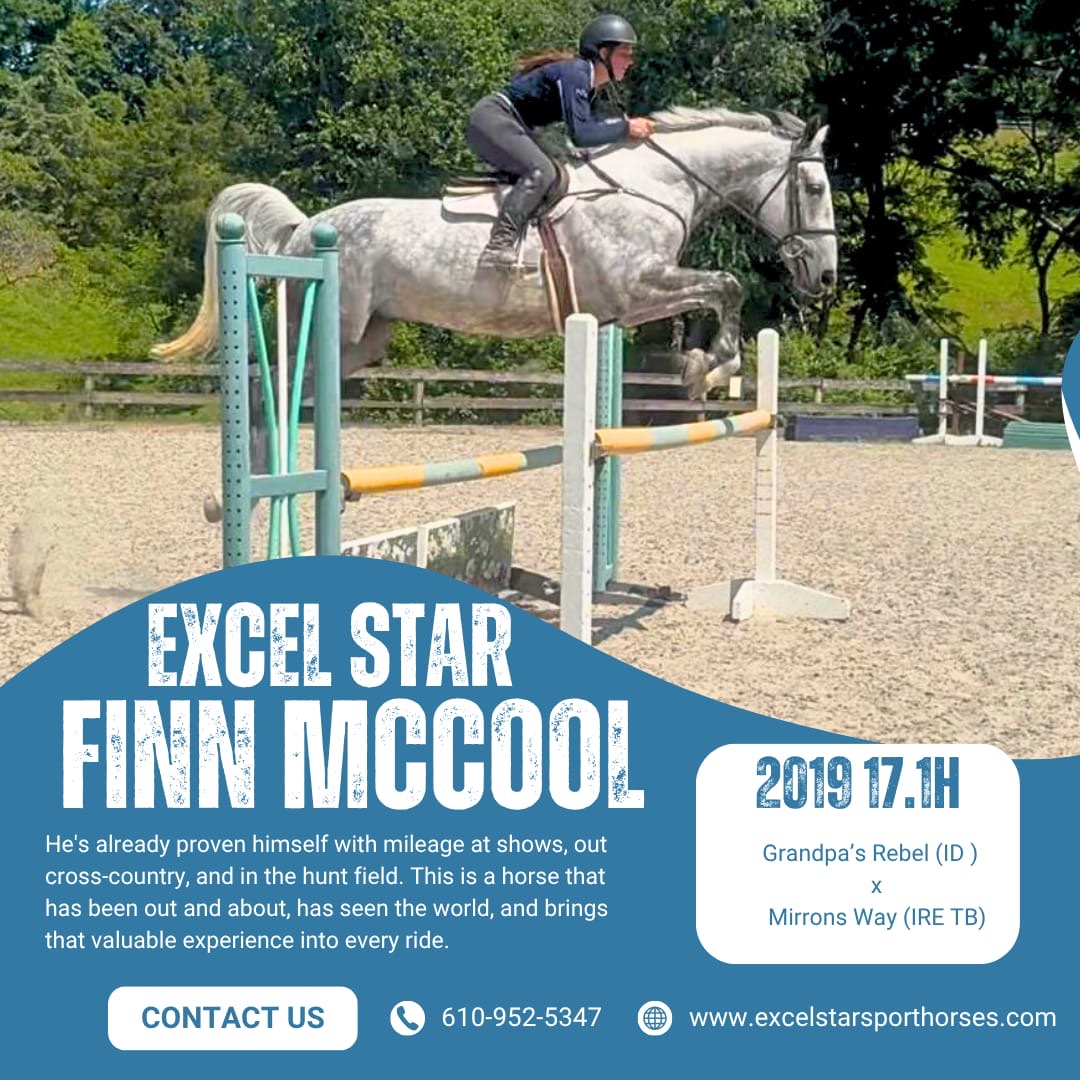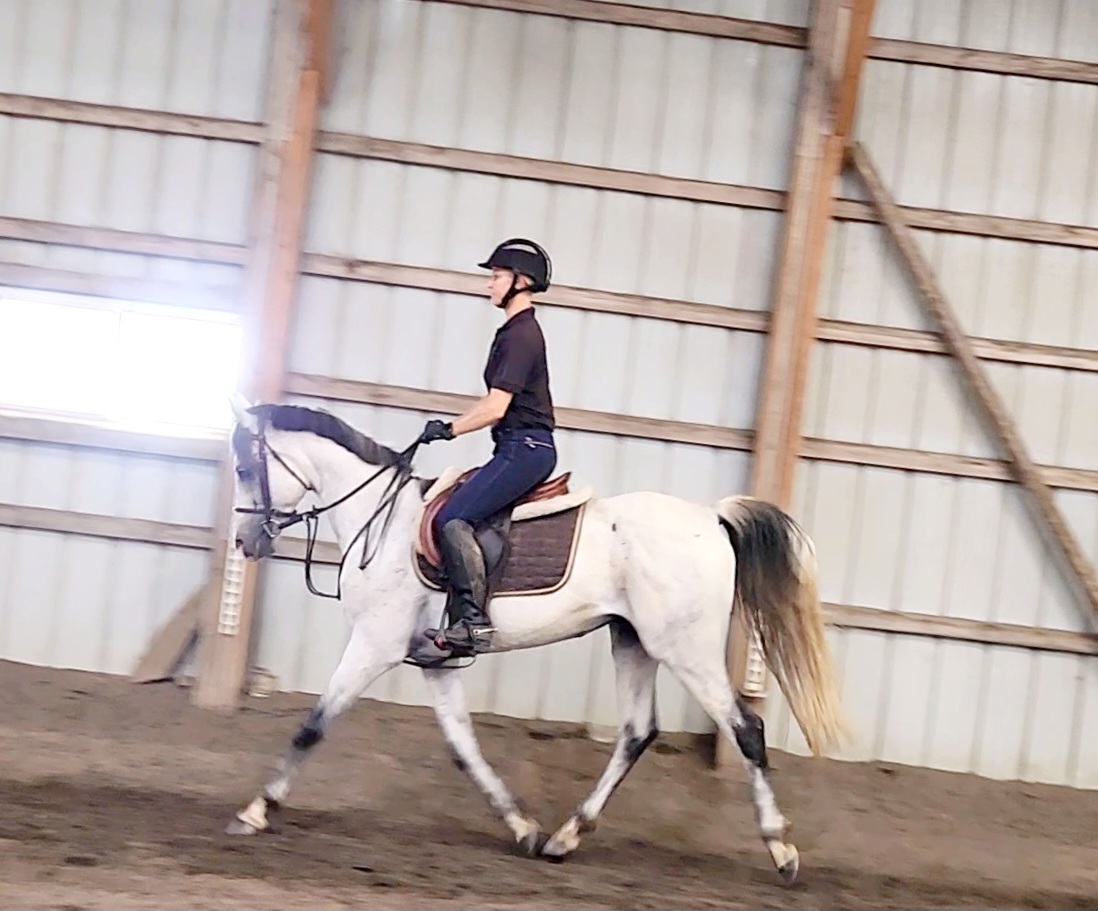Welcome to the new Amateur’s Corner on Eventing Nation! The goal of this series is to gather perspective, experience, and advice from the hardworking and dedicated amateurs that populate our sport. We’ll be doing Q&A profiles with amateurs from all walks of life, hoping their experiences can help others working to balance horses with, well, the rest of life. Do you want to participate in an Amateur’s Corner Q&A? Send your tip to [email protected]. To read more Amateur’s Corner Q&As, click here. Next up is 42-year-old Courtenay Tuxhorn from Area IX.

Courtenay Tuxhorn and BA Messenger. Photo courtesy of Xpress Foto.
EN: First, tell us a little about yourself.
CT: I am 42 and this year will be my fourth year eventing. I’m from Maryland originally, but I have lived a lot of places. I’m currently living just outside Ocala, Florida for the winter.
EN: What or who gave you the “eventing bug”?
CT: I always thought eventing was cool but didn’t really have access to it growing up. I did the hunters and some jumpers, and dressage when my family lived in the Philippines. I always rode Thoroughbreds (didn’t we all in the 90s!) and I just love the breed, so when I got back into riding after a 15 year hiatus, I knew I wanted a Thoroughbred and wanted to do a discipline that thoroughbreds excel in. It basically took one cross country outing on my OTTB for me to realize, oh yeah, this is definitely the sport for me.
EN: Tell us about your “work/life/ride balance”. What does this mean to you?
CT: I think it means always being conscious about which category gets what amount of time. I make room for compromise between “life” and “ride” at different points of the year. Work, on the other hand, is a constant, so it’s all about being efficient. I’m lucky that I wound up in a remote-ready profession and have been remote since 2016 – not having to commute to (let alone be in) an office, not having to dress up for work, not being expected to participate in happy hours and social events and other “forced fun”, these are huge time savers. Plus, I’m pretty adamant about not letting work seep into my free time. Even when I have a ton to do or when random urgent projects pop up, I do my best to fit it in to that 40 hour workweek. I’m just not interested in participating in “overwork” culture – it’s toxic, and what I do outside of that 40 hours is too important to me.
While I find it pretty easy to get work-to-non-work balance in my life, right now my life-to-ride balance is not exactly balanced. In addition to coming to Florida for the winter, my horse, BA Messenger (“Bam”) and I upgraded to Preliminary Level – both of these have been a bit all-consuming since late 2020. After my little Florida boondoggle though, I can’t wait to go rock-climbing with my husband!

Photo by Kim-Lee Tuxhorn.
EN: Describe a typical day in your week.
CT: For this winter in Florida, I am staying on a small private farm with Bam and doing self-care. I feel like I am in adult ammy heaven because I get to see and pat my horse way more than usual, it’s so awesome!
On a typical weekday I get up at 5:20 to feed Bam. Then I have my coffee and breakfast, do a bit of work emailing and planning for the day, then am back in the barn at 6 to turn Bam out and do his morning chores. Next I fetch Bam back in, do a quick groom and some mobilization exercises, ride him for 60-70 minutes, and turn him back out. I am back at my laptop at 9 and there until 5ish, although I pop my head up now and then to check on Bam, change his blanket(s), tell him he’s amazing, etc. Then after work I bring him in for his dinner and then I do some of my own stretching or mobility exercises, or go for a run, or if I have an errand to do I’ll go do it then. After Bam finishes his dinner I’ll groom him, clean my tack, get his breakfast ready, and then call my husband, make my own dinner, and go to bed around 9.
I’m already sad for when I’m back at a “normal” boarding barn and don’t get to see my horse so much, so I’m really hoping I can make this Florida trip an annual thing!
EN: What has been a challenge that amateurs often face that you’ve found a way to conquer?
CT: Budget is definitely an important one! Especially as it relates to big purchases. When I first got my horse I hadn’t considered needing a truck and trailer, it wasn’t on my radar – I think because I hadn’t realized yet how much eventers haul out for things, plus it seemed too expensive. I hitched a ride for my horse with a friend to one of our first cross-country schooling outings, and my husband came along to watch and take photos. On our way home, after Bam had shown a real aptitude for cross country, my husband was like “I think we need to get a proper truck and then you should get a horse trailer.” It was so sweet and genuine. So we sold his ’98 Tacoma (his “dream truck”!), bought an ’01 Ford diesel, I bought a trailer second-hand from someone at my barn, and it just opened up a whole new world. My truck is 20 years old and my trailer is only a couple years younger than that, it’s definitely the least fancy rig anywhere I go in the Florida scene, but it gets the job done!
EN: What is your best advice as an amateur rider? How do you “make it work”?
CT: I feel like this is so boring, but make a plan! And check it/use it daily! Whether it’s what I’m doing in a ride or how I’m structuring my season, my philosophy is no unplanned activities… it helps me keep an eye on the big picture and the day-to-day at the same time. I have years and years of google sheets with season plans, daily training logs, calculations of my EquiRatings stats, fitness notes, health/vet items, etc. I tried using an actual paper planner in a spiral notebook one year, which was fun because it had cute dog photos and random recipes in it, but it’s harder to search and refer to after the fact, so now I stick to an online spreadsheet.
EN: What drives you/motivates you the most?
CT: I have a lot of self-motivation. Growing up, my stepdad used to really encourage me, both athletically and intellectually. When I was 12 and he was 49, he and I were running a 10k race together, and he suffered a fatal heart attack as he crossed the finish line. His last words had been “go Courtenay!” It’s a really powerful memory for me. After Rick died, I pursued excellence in myself to honor him, until it just became who I am.

Photo by Kim-Lee Tuxhorn.
EN: What is the best or most impactful piece of advice you’ve gotten as an eventer?
CT: The fact that it’s hard for me to pick just one is really telling about how awesome this sport is. We amateurs get phenomenal access to the top professionals, they are right there at the events with us, they’re giving clinics and lessons and sharing their knowledge and experience, and even if you’re in another time zone you can learn a ton from them online. Everyone I’ve ridden with has had a gem of wisdom that met me in the moment I was in at the time, and they’ve all had an impact on me!
Most recently, I was on my own for XC warmup at my prelim upgrade because I rode late in the day and my coach down here just wasn’t able to be there, and even though he walked the course with me and gave me a great pep talk I still found it overwhelming. Afterwards I talked to the coach I rode with back in Maryland about it, and she said actually it’s great to get used to warming myself up, because as I go up the levels, help on site can be harder and harder to find. It’s advice that I’m finding really empowering: to internalize what I learn from each event, and to take responsibility and agency for my own success.
EN: In one sentence, what does the sport of eventing mean to you?
CT: My first event back after my horse and I flipped over a jump in the rain in 2019, I was in show jump warmup and I just lost it crying, thinking about what would happen if I messed up. My coach said the most perfect thing: “Just go out there and enjoy your lovely horse!” I think about it almost every ride now, ‘enjoying my lovely horse’ really captures the essence of why I love eventing!
EN: What is something with the sport that could evolve to better serve its amateur riders?
CT: I wish the sport could adopt an openness around accidents similar to other “extreme” sports, such as rock climbing or backcountry skiing. When an accident happens in those communities, invariably due to human error, a report on the circumstances hits the public domain within days. But in eventing when a rider or horse dies on course in an accident, it can be really hard/eye-numbing (seriously who invented internet forums) to find out what happened and how circumstances unfolded even months or a year later. Which means it’s hard for the community as a whole to learn from the tragedy. Which makes it harder not to repeat the tragedy. I think secrecy around accidents hurts amateur riders the most. As an amateur, I have one horse, one chance on course – I don’t have multiple rides a day on which I can learn. So I have to rely on other information to learn and grow as a rider – books, articles, videos, the experiences of other riders, etc., and I hope the governing bodies would keep that in mind when they are deciding what to do with information about casualties in the sport.



















